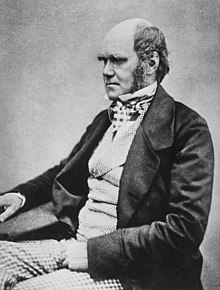
English sceptics
Charles Robert Darwin ( DAR-win; 12 February 1809 – 19 April 1882) was an English naturalist, geologist, and biologist, widely known for his contributions to evolutionary biology. His proposition that all species of life have descended from a common ancestor is now generally accepted and considered a fundamental concept in science.
2 episodes
Episodes in this category also belong to the following categories:
Bertrand Russell
Melvyn Bragg and his guests discuss the influential 20th-century British thinker Bertrand Russell, widely regarded as one of the founders of Analytical philosophy.
6 December 2012
Featuring: A. C. Grayling, Mike Beaney, Hilary Greaves
PhilosophyNobel laureates in LiteratureBritish philosophers of languageGeorgistsEnglish political writersFree love advocatesSet theoristsAristotelian philosophersWriters about religion and scienceJerusalem Prize recipientsFellows of Trinity College, CambridgeEnglish logiciansPhilosophers of mathematicsBritish historians of philosophyEmpiricistsOntologistsMetaphysics writersBritish political philosophersFellows of the Royal SocietyMetaphilosophersTheorists on Western civilizationBritish ethicistsPhilosophers of literatureBritish free speech activists20th-century English philosophersAnalytic philosophersEnglish humanistsRhetoric theoristsAtheist philosophersEnglish political philosophersEnglish anti-fascistsEnglish people of Scottish descentPhilosophers of historyEnglish agnostics20th-century atheistsConsequentialistsEnglish socialistsPhilosophers of social scienceBritish philosophers of religionPresidents of the Aristotelian SocietyLogiciansPhilosophers of lawPhilosophers of sexuality19th-century English mathematiciansCritics of work and the work ethicSecular humanistsPhilosophers of technologyPhilosophers of economicsWriters about globalizationBritish philosophers of educationBritish philosophers of culture, English pacifistsBritish philosophers of logicCritics of the Catholic ChurchPeople from MonmouthshireAlumni of Trinity College, CambridgeLinguistic turnPhilosophers of loveEuropean democratic socialistsBritish consciousness researchers and theoristsWriters about activism and social changeEnglish Nobel laureatesMembers of the Order of MeritEnglish prisoners and detaineesUtilitariansIntellectual historians, University of Chicago facultyEnglish scepticsBritish critics of ChristianityEnglish people of Welsh descentUniversal basic income writersBritish philosophers of mind19th-century English philosophersBritish critics of religionsAcademics of the London School of Economics, British philosophers of science19th-century atheistsUniversity of California, Los Angeles facultyAnti-nationalists20th-century English mathematiciansEnglish essayistsFreethought writersBritish atheism activistsWriters about communism19th-century English essayistsEnglish male non-fiction writersDarwin: On the Origins of Charles Darwin
Melvyn Bragg presents a series about the life and work of Charles Darwin. Darwin's early life and time at Cambridge, where his interests shifted from religion to natural science.
5 January 2009
Featuring: Jim Moore, Steve Jones, David Norman, Colin Higgins
ScienceEnglish travel writersTheoretical biologistsFellows of the Royal SocietyMembers of the Royal Netherlands Academy of Arts and SciencesEnglish AnglicansUtilitariansEnglish abolitionists19th-century British biologists, 19th-century English naturalists, British evolutionary biologists, Fellows of the Linnean Society of London, Fellows of the Royal Geographical Society, Fellows of the Zoological Society of LondonBurials at Westminster AbbeyEnglish sceptics19th-century AnglicansRecipients of the Copley MedalAlumni of Christ's College, CambridgeEnglish agnosticsCharles DarwinAlumni of the University of Edinburgh19th-century English writersCircumnavigators of the globeRecipients of the Pour le Mérite (civil class)Members of the American Philosophical SocietyDeaths from coronary thrombosisMembers of the Royal Swedish Academy of SciencesMembers of the Lincean AcademyIndependent scientistsHuman evolutionRoyal Medal winners

